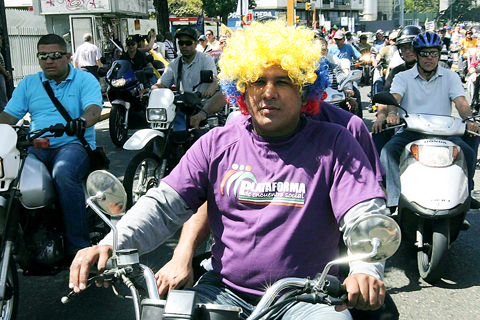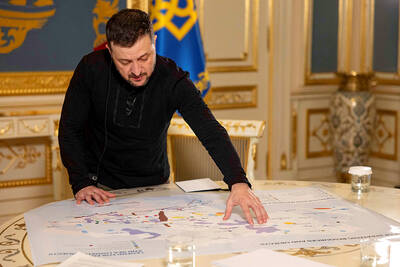Venezuelan cable television providers stopped transmitting a channel critical of President Hugo Chavez yesterday after the government cited noncompliance with new regulations requiring the socialist leader’s speeches be televised on cable.
Radio Caracas Television (RCTV), an anti-Chavez channel that switched to cable and satellite television in 2007 after the government refused to renew its over-the-air license, disappeared from TV sets shortly after midnight.
RCTV was yanked from cable and satellite programming just hours after Diosdado Cabello, director of Venezuela’s state-run telecommunications agency, said several local channels carried by cable television had breached broadcasting laws and should be removed from the airwaves.

PHOTO: EPA
Cabello warned cable operations on Saturday evening that they could find themselves in jeopardy if they keep showing those channels.
“They must comply with the law, and they cannot have a single channel that violates Venezuelan laws as part of their programming,” he said.
Several channels have not shown Chavez’s televised speeches when he orders all media to air them — a requirement under new regulations approved last month by the telecommunications agency, Cabello said.
RCTV did not broadcast a speech by the president to his political supporters during a rally early on Saturday.
The station’s removal from cable and satellite television prompted a cacophony of protests in Caracas neighborhoods as Chavez opponents leaned out apartment windows to bang on pots and pans.
Others shouted epithets and drivers joined in, honking car horns.
“They want to silence RCTV’s voice,” said Miguel Angel Rodriguez, the channel’s most popular talk show host. “But they won’t be able to because RCTV is embedded in the hearts of all Venezuelans.”
The US Embassy in Caracas expressed concern about the decision.
“Access to information is a cornerstone of democracy and provides a foundation for global progress. By restricting yet again the Venezuelan people’s access to RCTV broadcasts, the Venezuelan government continues to erode this cornerstone,” embassy spokeswoman Robin Holzhauer said.
Venezuela’s telecommunications agency has said in the past week that under new rules, two dozen local cable channels including RCTV must carry government programming when officials deem the measure necessary, just like channels on the open airwaves already do.
Chavez often uses the measure to force all the country’s TV channels and radio stations to broadcast his speeches.
Cabello said on Saturday that other violations committed by cable channels include failing to warn viewers of sexual and violent content as well as broadcasting more than two hours of soap operas during the afternoon, which should be mostly dedicated to children programming.
He did not specify which TV channels have purportedly violated the law, but RCTV said it was the target. It accused the agency of pressuring cable providers to drop channels that are critical of the government.
The agency “doesn’t have any authority to give the cable service providers this order,” RCTV said in a statement. “The government is inappropriately pressuring them to make decisions beyond their responsibilities.”
In denying RCTV renewal of its over-the-air broadcast license, Chavez accused it of plotting against his government and supporting a failed 2002 coup.
In August, Chavez’s government forced 32 radio stations and two small TV stations off the air, saying some owners had failed to renew their broadcast licenses while other licenses were no longer valid because they had been granted long ago to owners who are now dead. Officials said they planned to take more stations off the air.
Government figures say that as of 2008 about 37 percent of Venezuelan homes received cable television.

Thousands gathered across New Zealand yesterday to celebrate the signing of the country’s founding document and some called for an end to government policies that critics say erode the rights promised to the indigenous Maori population. As the sun rose on the dawn service at Waitangi where the Treaty of Waitangi was first signed between the British Crown and Maori chiefs in 1840, some community leaders called on the government to honor promises made 185 years ago. The call was repeated at peaceful rallies that drew several hundred people later in the day. “This government is attacking tangata whenua [indigenous people] on all

RIGHTS FEARS: A protester said Beijing would use the embassy to catch and send Hong Kongers to China, while a lawmaker said Chinese agents had threatened Britons Hundreds of demonstrators on Saturday protested at a site earmarked for Beijing’s controversial new embassy in London over human rights and security concerns. The new embassy — if approved by the British government — would be the “biggest Chinese embassy in Europe,” one lawmaker said earlier. Protester Iona Boswell, a 40-year-old social worker, said there was “no need for a mega embassy here” and that she believed it would be used to facilitate the “harassment of dissidents.” China has for several years been trying to relocate its embassy, currently in the British capital’s upmarket Marylebone district, to the sprawling historic site in the

‘IMPOSSIBLE’: The authors of the study, which was published in an environment journal, said that the findings appeared grim, but that honesty is necessary for change Holding long-term global warming to 2°C — the fallback target of the Paris climate accord — is now “impossible,” according to a new analysis published by leading scientists. Led by renowned climatologist James Hansen, the paper appears in the journal Environment: Science and Policy for Sustainable Development and concludes that Earth’s climate is more sensitive to rising greenhouse gas emissions than previously thought. Compounding the crisis, Hansen and colleagues argued, is a recent decline in sunlight-blocking aerosol pollution from the shipping industry, which had been mitigating some of the warming. An ambitious climate change scenario outlined by the UN’s climate

BACK TO BATTLE: North Korean soldiers have returned to the front lines in Russia’s Kursk region after earlier reports that Moscow had withdrawn them following heavy losses Ukrainian President Volodymyr Zelenskiy on Friday pored over a once-classified map of vast deposits of rare earths and other critical minerals as part of a push to appeal to US President Donald Trump’s penchant for a deal. The US president, whose administration is pressing for a rapid end to Ukraine’s war with Russia, on Monday said he wanted Ukraine to supply the US with rare earths and other minerals in return for financially supporting its war effort. “If we are talking about a deal, then let’s do a deal, we are only for it,” Zelenskiy said, emphasizing Ukraine’s need for security guarantees